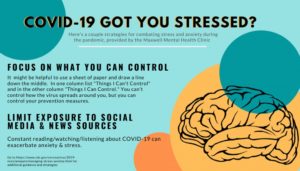We are all learning to deal with this new life under the COVID-19 pandemic and it’s completely understandable that this much change might cause you to feel uneasy. It is an unprecedented time in all of our lives and there was no way to prepare for the feelings it has brought up for many of us. The mental health effects of COVID-19 are as essential to address as the physical health effects. Cancelled travel plans, indefinite isolation, panic over scarce resources, and information overload could stir up anxiety and a feeling of isolation. Anxiety is our body’s response to stress and threats. It can come in many forms: a nagging thought, a self-criticizing question that won’t leave you alone, your stomach dropping like you’re on a roller coaster, a tight feeling in your muscles or chest, or even a full-blown heart-racing panic attack.
Here are a few steps that could help reduce your anxiety:
Step 1: Breathe.
Often times, the hardest part of anxiety is a feeling of helplessness as your body’s systems step into overdrive without your consent. Mindful breathing helps to slow a racing heartbeat and release tension in the body. It can lessen the effects of your anxiety and take you closer to being back in control. It’s about reducing your experience down to one single action. Focus on every little detail of your breath. Practice mindful breathing even when you’re not feeling anxious in order to be familiar with the technique.
Step 2: Acknowledge and Accept.
There is absolutely nothing wrong with you for feeling anxious during these times. Ignoring the stress or judging yourself for feeling it is tempting, but it won’t do much to help. You can’t deal with something that you’re pretending isn’t there. Acknowledging your feelings, even if they’re scary, can help you cope in a healthy way.
Step 3: Go Easier on Yourself.
Anxiety often stems from our own expectations of ourselves. Now more than ever, we need to go easy on ourselves and be willing to forgive ourselves when things don’t go as planned. Finish work-from-home a little earlier if you need to, extend deadlines, or buy yourself some more time. Let yourself off the hook for not working out and aim to do it the next day. Be kind to yourself.
Here are some additional pointers to help you survive getting through negative thoughts about this uncertain time:
1. Take Breaks from COVID Coverage.
Limit the amount of time you spend watching, reading, or listening to news stories.
2. Re-Frame your Outlook.
Instead of thinking, “I am stuck inside”, try to look at the positive of “I can finally focus on my home and myself. Think of the stay-at-home order as an opportunity to refocus your attention from the external to the internal. Completing one productive task each day can lead to a more positive attitude. Set you sights on long-avoided tasks, reorganize, or create something you’ve always wanted to. Approaching the time with a mindset of feeling trapped or stuck will only stress you out more. This is your chance to really slow down and focus on yourself.
3. Keep the Chaos to a Minimum.
With all the uncertainty happening outside your home, try to keep the inside organized, predictable, and clean. Setting up mental zones for daily activities can be helpful to organize your day. Try not to eat in bed or work on the sofa – just as before, eat at the kitchen table and work at your desk. Loosening these boundaries can muddle your routine and can make the day feel very long.
The following are some ideas and free resources on how to reduce stress and anxiety:
1. Learn and practice relaxation techniques such as breathing exercises or mindfulness/meditation.
Try one of these free apps:
Or follow these Yoga Breathing Techniques or try Triangle Breathing
2. Keep a Journal.
Expressing thoughts can increase self-awareness. Even a simple daily gratitude journal could help keep a positive attitude.
3. Exercise regularly and eat healthy meals.
Your body can fight stress better when it is fit.
4. Make time for hobbies, interests, and relaxation.
5. Connect with others.
There are plenty of free platforms, such as Skype or Zoom, that allows you to virtually connect with friends and family while maintaining a safe distance.
- Call or text 1737 to talk with a trained counsellor any time.
- Anxiety Helpline – (0800)269-4389 (0800 ANXIETY)
- Lyf App – Connect with others as yourself or anonymously without the fear of judgement
-Paulina Le, Health Fitness Specialist

